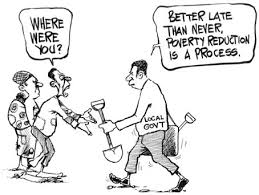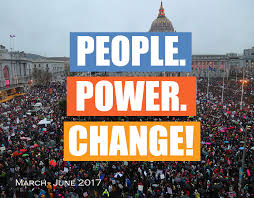In 2015/16 we consulted members on the crafting of a new global definition for community development for the association. This was approved by the IACD Board and launched at our 2016 international conference in the USA. The new definition sees community development as being a practice-based profession and an academic discipline concerned with the organisation, education and empowerment of people within their communities.
In adopting this definition, we noted that there were many definitions around about what community development was and acknowledged in the words of the Chinese that a thousand flowers had bloomed. However we felt that there was a downside to this, as the two English language words ‘community’ and ‘development’ were imprecise and had long become a spray on term, used by organisations that might not share the same values base and our firm commitment to the promotion of ‘participative democracy, sustainable development, rights, economic opportunity, equality, and social justice’.
During the member consultation and subsequently apprehensions were raised that by adopting such words as practice-based ‘profession’ and academic ‘discipline’, IACD was creating a distance between ‘the profession’ and the communities we are all there to serve. This is a longstanding debate in community development work since the days of Ivan Illich’s powerful critique in his books Deschooling Society and Disabling Professions, of the ways in which other professions have created mystifying barriers between themselves and ordinary people e.g. through the use of technical language people don’t understand (a hole community development academics have certainly at times fallen into), and where the profession tends to serve its own interests rather than the people it is there to assist.
This is a powerful critique that has subsequently fuelled both left and right wing populism and the current Trumpist criticism of ‘experts’ and ‘science’. We are not saying here that these colleagues working as community development practitioners are right wing populists, but what we are asserting is that there has been a huge risk for our field in allowing others to use the term loosely. Seeing community development as being a profession and academic discipline is a statement of fact and a statement by the international body that seeks to represent community developers internationally. We are not saying that we are a closed guild, but that we do believe in high occupational standards, progressive ethics and in enhancing the professionalism and scholarship in our field.
A central tenet of the community development practice and scholarship we support is that the ways in which we work with communities, the process and the outcome of that work, should be an empowering one for people. Activities, campaigns, education and health programmes etc should always be co-designed and co-produced with the people we work with. When a community development worker leaves a community their community education and organisational work should have shared knowledge and skills with the people they have been working with. And it is here that the notion of community-led development has become so popular. Indeed it has now been adopted by the World Bank no less as a major strategy in its programmes to tackle poverty. This sounds good. And putting communities, of place, identity and interest, in the driving seat is an approach we would generally support and encourage community development practitioners to adopt.
But not always. There is a risk that this sounds too much like the approach promoted in the 1950s under the guise of ‘non directive’ community development work. This approach was often misunderstood and discouraged some practitioners from being more ‘directive’ in their community education and community organising work, when this might have been just what was necessary. Community development workers, in particular those that are paid to do a job, are paid to do just that i.e to do a job. They are employed because they have worked hard to acquire knowledge and skills that are there to assist the people they work with, who are generally disadvantaged in some way, to tackle that disadvantage more effectively. To withhold knowledge and skills from a community is as manipulative as running things in a top down way. Both approaches we should criticise. It is here that we should also be wary of the ‘process is everything’ mantra. Community development work is NOT just about process, i.e the way we work with people. It is also about the outcome. The cartoon below sums this up well.

We strongly support well designed and funded programmes by agencies that help put communities in the driving seat as co-designers and co-architects of the ways in which their community is developed. But we also hold to the view that the intervention and support of professionally trained community development workers can help that process enormously. The two can and should be complementary. In recent years, with the huge cuts in public service programmes funded by governments around the world, there has also emerged a growing policy interest in handing over public services e.g libraries, swimming pools, social care, even publicly owned land to local communities. This is being promoted by governments as a significant movement towards community empowerment. We examined this in the last issue of IACD’s magazine Practice Insights. https://www.iacdglobal.org/2017/04/24/latest-issue-of-iacds-magazine-out/
There is no doubt that for some communities the transfer of assets to local ownership and management has proved liberating, particularly when the asset can in turn be harnessed as a community enterprise generating income for community benefit. But for many communities there is activist fatigue, where the reality is that the small percentage of a community that sustain their involvement in community action (estimated at around 4%) find themselves taking on too much. It’s one thing running your own library or care centre for children, but being expected to do that without the revenue funds to employ a librarian or child care worker is no easy task. And as we have reported elsewhere, this rush by governments to hand over services previously managed by local authorities and their professional staff, is a symptom of the reduction in the role of the state, promoted heavily by the neo cons. This does not mean however that public service professionals ran these services well. Some clearly did not and community development workers have often been at the forefront of people critical of the ways in which planners, doctors, public housing officials have worked when done in didactic and patronising ways. Here was the worse of so called professionalism, where the so called expert failed to listen and learn from local communities and frankly further disempowered them.
Saying that community development is a practice-based profession and academic discipline is not an argument for distancing ourselves from the communities we are there to serve. Far from it. But it is a statement that values professionalism, does not disdain expertise, is not anti the intellectual or anti science. Community development work is sometimes very hard and entails technical expertise. If the community development workers does not have that expertise, s/he should be able to know how to secure it for the community’s benefit.
Finally a brief word on the difference between the volunteer community activist and the professional community development worker (paid and unpaid). Again both are complementary but they are not identical and have different levels of accountability. Perhaps we should see these roles as part of a spectrum. And as IACD has long argued, we need to be helping more and more community activists to become community development workers should they wish to do so. Theirs is the sort of passion we need.

